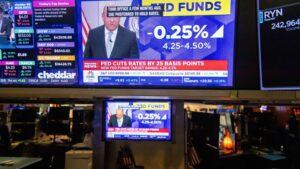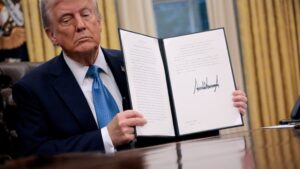Highlights:
Highlights
Economic Uncertainty: The article emphasizes how economic uncertainty, driven by factors like political fragmentation, macro shocks, and events such as the war in Ukraine, significantly contributes to market nervousness.
Impact on Investor Psychology and Sentiment: It discusses how high economic uncertainty affects investor psychology and sentiment, leading to changes in behavior, stock returns, analyst forecasts, and overall market sentiment.
Role of Economic Indicators: The role of key economic indicators like GDP, consumer confidence, and stock market trends in assessing the state of the economy and market conditions is thoroughly analyzed.
Summary
The article discusses the causes and impacts of market nervousness amid a slowdown or economic recession. This includes a wide array of factors such as large portfolio sell-offs, poor corporate earnings, rapid debt accumulation, and sharp increases in asset prices, which contribute to depreciating stock market value and negative returns . The article highlights the role of economic uncertainty, driven by factors such as political fragmentation, macro shocks like the COVID-19 pandemic, and events such as the war in Ukraine .
The impact of economic uncertainty on investor psychology and sentiment is also examined. Changes in investor perceptions and behavior can impact stock return synchronicity, analyst forecast accuracy, and overall market sentiment . Furthermore, the influence of market conditions on nervousness and the role of key economic indicators in assessing the state of the economy are discussed .
Notably, the article covers the effect of specific events, such as the COVID-19 pandemic, geopolitical conflicts, and trade tensions on market nervousness . These events can exacerbate economic uncertainties, disrupt global supply chains, and impact investor behavior. The article also delves into key indicators of a potential economic slowdown or recession, triggers for a recession, and the impacts of trade policies . The role of investor sentiment, market mechanisms, and broader market sentiments in influencing individual stock prices and the overall market environment during a slowdown or recession is also thoroughly analyzed .
Causes of Market Nervousness Amid Slowdown or Recession
Market nervousness amid an economic slowdown or recession is often attributed to a combination of factors at both the macro and micro levels of the economy . This involves factors such as large portfolio sell-offs, poor corporate earnings, sharp increases in asset prices, and rapid accumulation of debt . These factors often result in depreciation of the overall stock market value and negative returns, particularly in the early part of a recession .
Economic Uncertainty
Economic uncertainty is one of the main driving factors of market nervousness . Inability to forecast future events and their effects creates a level of uncertainty that can significantly affect the accuracy of sales and production trends that companies typically predict . Furthermore, political fragmentation between countries, macro shocks like the COVID-19 pandemic, and events such as the war in Ukraine contribute to increased uncertainty and keep markets volatile .
Impact on Investor Psychology and Sentiment
High economic uncertainty also impacts investor psychology and sentiment . Investor perceptions and behavior tend to change under these conditions, with stock return synchronicity, analyst forecast accuracy, and market sentiment being particularly affected . The conventional capital asset pricing model theory suggests that the impact of sentiment on market volatility may cause market uncertainty and lead to less returns . Investor sentiment can significantly influence short-term stock market returns, particularly when there is an increase in firm-level uncertainty .
Role of Economic Indicators
The state of the economy is often gauged by key indicators such as GDP projections, consumer confidence, and stock market trends . A focus on GDP alone is often inadequate, and a wider set of measures of economic activity is usually considered to determine whether a country is indeed suffering a recession . For instance, VIX values greater than 30 signal heightened volatility in the market due to increased uncertainty, risk, and fear, while values below 20 indicate periods of lower stress and increased stability .
Influence of Market Conditions
Market conditions also play a significant role in creating market nervousness . Newly developed daily market conditions indicators for key segments like foreign exchange, US money and Treasury markets capture known episodes of market stress . Additionally, an individual company’s profit, revenue, and debt load aren’t the only things driving its stock price; broader market sentiment, influenced by major economic indicators, also impacts individual stock prices to varying degrees .
The Role of Specific Events in Market Nervousness
This section explores the impact of specific events on market nervousness, highlighting their role in amplifying economic uncertainty. Three primary events have been identified as catalysts of significant economic disruptions: the COVID-19 pandemic, geopolitical conflicts, and trade tensions.
COVID-19 Pandemic and Market Sentiment
The COVID-19 pandemic has substantially affected global investor sentiment, primarily due to the lack of information regarding the potential economic implications of the pandemic. Behavioral finance studies illustrate that investor emotions and anxiety significantly influence their investment decisions in stock markets. The COVID-19 pandemic has been identified as a primary source of these economic anxieties and uncertainties.
Geopolitical Conflicts and Economic Uncertainty
The early 2022 military conflict between Russia and Ukraine serves as another example of an event causing heightened economic uncertainty. The conflict adversely affected market sentiment regionally and globally, leading to investor panic and increased risk aversion. These geopolitical events often lead to a disconnect between the economy and the market, increasing the likelihood of a sudden rise in financial market volatility and a significant drop in asset prices following an adverse shock.
Trade Tensions and Market Reactions
Trade tensions, such as those between the U.S. and China, have also been identified as substantial contributors to market nervousness and economic uncertainty. The imposition of tariffs has not only reduced trade between the U.S. and China but also negatively affected consumers and producers in both countries, thereby impacting global growth. Despite some benefits of trade with China for U.S. consumers and companies, such as lower prices and increased access to China’s market, escalating trade tensions could severely impact business and financial market sentiment, disrupt global supply chains, and threaten the projected recovery in global growth. The unpredictability of these events, their potential repercussions, and the inability to accurately forecast their effects contribute to market uncertainty.
Key Indicators of Potential Economic Slowdown or Recession
A potential economic slowdown or recession is typically indicated by two consecutive quarters of negative GDP growth, although other economic indicators such as declining GDP, rising unemployment, and falling consumer confidence may also signal trouble. While experts remain divided on the imminent occurrence of a full-scale recession, uncertainty is causing anxiety among investors and businesses.
Triggers for Recession
A recession can also be instigated by a country’s decision to reduce inflation through the use of contractionary monetary or fiscal policies. When utilized excessively, these policies can lead to a decline in demand for goods and services, ultimately resulting in a recession. Moreover, some recessions, such as the one that began in 2007, are deeply rooted in financial market problems.
Trade Policies and Recessions
Changes in trade policies can have significant effects on global economies. For instance, data suggests that the share of world goods trade liberalized worldwide has fallen by half in the years following President Trump’s election compared to the three years prior. This shift away from open trade is worrying to economists and trade experts.
The trade war policies currently in place sum up to $79 billion in tariffs based on trade levels at the time of tariff implementation, potentially influencing the onset of a recession. In a global value-chain trade, the negative impact of duties can spread throughout the entire chain, inducing firms in countries where trade remedy actions are frequent to eliminate participation, which can have long-lasting effects.
Recession Impacts
Once a recession occurs, it usually results in commodity prices resetting to a lower level, and a sector rotation in the stock market. The effects of a recession, such as market instability, often trigger shifts in investment from volatile sectors like consumer cyclicals and consumer discretionary.
The appointment of new individuals to cabinet and staff positions, such as Howard Lutnick as Secretary of Commerce, can also influence trade policies and potentially exacerbate recessionary trends. Lutnick, in particular, has advocated for using tariffs as an industrial policy tool, aligning with Trump’s own views.
Trade Policy Recommendations
To avoid the negative effects of a potential recession, it is recommended that trading countries, including the United States and China, work towards improving the functioning of the market mechanism. This can be achieved by eliminating non-market measures, enhancing intellectual property protection, and adhering to a set of multilateral trade rules. Implementing such measures can prevent unilateral import restrictions by the United States and retaliatory measures by trade partners such as China.
Key Factors Contributing to Market Nervousness During a Slowdown or Recession
During a slowdown or recession, several key factors contribute to a nervous market. Investor sentiment plays a significant role in the capital market as it influences market volatility, causing uncertainty about future returns on investments . This sentiment can positively affect short-term returns, especially when uncertainty increases . The impact of investor sentiment on the market is complex and can be influenced by various macroeconomic indicators, political events, economic uncertainties, and financial market trends .
Trade tensions and policies can also contribute to market nervousness. For example, the U.S.-China trade tensions have been a significant factor . Policies like import restrictions and retaliatory measures can lead to a reduction in imports, increased domestic production, and higher consumer prices. These measures can make foreign goods more expensive or limit the supply of foreign goods in domestic markets, further fueling uncertainty . It is thus suggested that all trading countries, including the U.S. and China, work towards improving market mechanisms by eliminating non-market measures and enhancing intellectual property protection .
Furthermore, economic indicators and broader market sentiments significantly influence individual stock prices . For instance, fluctuations in interest rates can influence investor sentiment . Instruments like the Investopedia Anxiety Index (IAI), which gauges investor sentiment based on the behavior of millions of Investopedia readers worldwide, have shown signs of turbulence in the markets, indicating that investors are worrying about their personal finances .
The content is provided by Blake Sterling, Financial Pulse Now






















